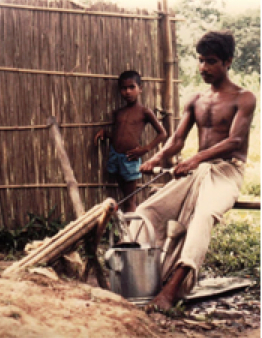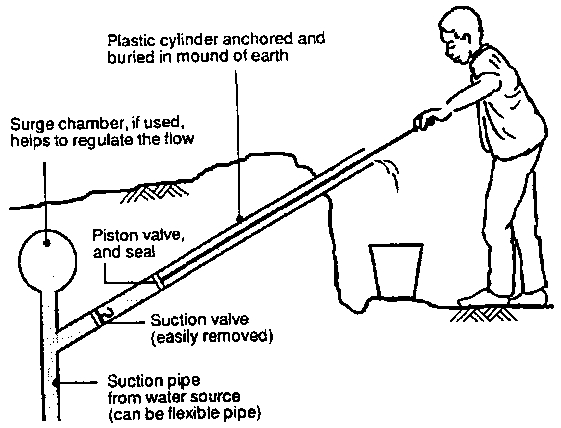Difference between revisions of "Rower pump"
| Line 1: | Line 1: | ||
| − | [[Image:rower pump icon.png|right| | + | [[Image:rower pump icon.png|right|80px]] |
[[Image:rower pump.jpg|thumb|right|200px|The rower pump was made to use for prolonged periods of time. Photo: [http://www.rural-water-supply.net/en/implementation/handpump-overview/rower-pump RWSN.]]] | [[Image:rower pump.jpg|thumb|right|200px|The rower pump was made to use for prolonged periods of time. Photo: [http://www.rural-water-supply.net/en/implementation/handpump-overview/rower-pump RWSN.]]] | ||
__NOTOC__ | __NOTOC__ | ||
| Line 34: | Line 34: | ||
|- | |- | ||
! width="50%" style="background:#efefef;" | Advantages | ! width="50%" style="background:#efefef;" | Advantages | ||
| − | ! style="background:# | + | ! style="background:#f0f8ff;" | Disadvantages |
|- | |- | ||
| valign="top" | Cheaper construction than most reciprocating suction and lift pumps<br> | | valign="top" | Cheaper construction than most reciprocating suction and lift pumps<br> | ||
Revision as of 05:20, 24 September 2013

The Rower pump was developed as a simple manually operated pump for small scale irrigation. The Rower Pump is a suction pump in which the piston is directly activated. A surge chamber (an air vessel just downstream of the foot valve, makes the pumping operation smoother). It is a simple and reliable pump with very few moving parts thus wear is reduced.
It is easy to repair and maintain. The sitting position of the operator is ergonomically favourable and makes it easy to pump for prolonged periods, thus well suited for irrigation. The pump has limited use for drinking water as the spout is relatively low. Typically, Rower Pumps are installed in collapsible tube wells with the screen extending to the coarse sand aquifer.
Suitable conditions
About 200,000 pumps have been made in Bangladesh.
| Pumping depth (Lift): | 0 to 8 m |
| Cylinder diameter: | 54.4 mm |
| Stroke: | variable |
| Yield: | (75 watt input, at 5 m head) ~ 4.5 m³/hour |
| Population served: | 0.1 hectare or 50 to 100 people |
| Type of well: | collapsible tube well or dug well |
| Advantages | Disadvantages |
|---|---|
| Cheaper construction than most reciprocating suction and lift pumps - Maintenance using local skills and materials |
Limited to wells of less than 7 metres in depth |
Construction, operations and maintenance

All components are made from plastic; Surge chamber-blow moulded plastic, plunger and foot valve have rubber flap valves; rising main-PVC pipe with a Robo screen filter.
The installation of the Rower 6 pump is easy and does not need any lifting equipment or special tools. The drillers who sink the tube well with the sludger method also install the pump. This pump has an excellent potential for maintenance by the users. All repairs can be done without the use of tools.
Industrial production: large scale production in local or foreign industrial units. The cast iron design required foundry equipment and skills.
Costs
Approx US$ 100-200 including tube well (depending on installation depth and drilling method).
Acknowledgments
- Implementation • Handpump Technology: Rower Pump, RWSN.
- Jane Olley. HUMAN & ANIMAL POWERED WATER-LIFTING DEVICES FOR IRRIGATION. Practical Action. November, 2008.
